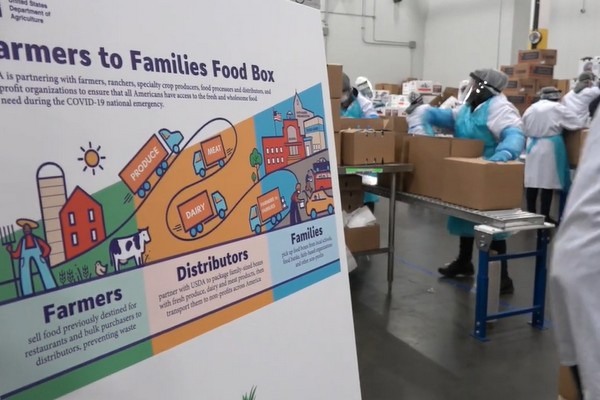Today, president-elect Donald Trump will be inaugurated as the 47th president of the United States. So with a new administration in place, how is the produce industry feeling about the next four years?
"Our industry is feeling mostly optimistic about the new administration," says Nick Wishnatzki of Wish Farms based in Plant City, Florida. "We expect that specialty crop farmers and the produce industry will have a productive relationship with the Trump administration. He has shown a willingness to hear our concerns and understands that having a vibrant domestic produce industry is vital to national security."
At Race-West Company, Inc. based in Clarks Summit, Pennsylvania, Harris S. Cutler says indeed, there is a feeling that businesses are going to get a lot of positive government attention. "We think there will be a lot of programs for distribution of fresh produce to those in need and to school lunch programs," says Cutler. "Our industry rose remarkably through the ravages of Covid under the first Trump administration. Trump focused on industry professionals to get the job done competitively and we rose up."
Part of that increased competitiveness may also be focusing on produce consumption. "We'd like to see ag trade promoted internationally and also promoting fruits and vegetables domestically," says Tim Mansfield of Burt, New York-based Sun Orchard Apples.
"We will see a focus on fresh produce like we saw in the last Trump administration. Trump will gather industry experts for ideas to improve food safety and the availability of fresh produce through the professionals," adds Cutler, adding that he also expects the administration to look at initiatives to drive competition.
 Photo: Facebook
Photo: Facebook
Initiatives of the past
Look no further than the introduction of the USDA Farmers to Families Food Box program under then-Secretary of Agriculture Sonny Perdue. "It was a strong support of U.S. specialty crops when the Covid pandemic hit," says Jordan Vande Guchte of Superior Sales based in Hudsonville, Michigan. "The ripples from raised demand for produce bolstered markets to finish out a season that many were concerned about. For that alone, I am both grateful in reflection and optimistic looking ahead."
However, there are also specific issues the industry would like to see addressed starting with labor. "Will the realization come to both sides that American horticulture must have a good foreign labor program to survive, and not one run by the DOL (H2A)?" asks Jamey Vogel of Vogel Orchard in Fredericksburg, Texas. "It seems like a non-political issue that both sides should support. There are no American workers for these jobs, so quit trying to make that happen."
"We hope President Trump upholds his campaign promise to ease unnecessary rules, regulations, and bureaucratic overreach," adds Wishnatzki. "The most challenging and expensive part of farming is labor. The burdensome H2A program desperately needs reform. Labor costs and availability are a huge problem that is only getting worse. In the short term, we need more business-friendly guest worker rules. In the long term, we need automated solutions that the government should incentivize and invest in. We now have at least a fighting chance to achieve some positive action on these fronts."
"The largest government-related issue is H2A worker visa rates. The majority of our farmers have had to go this route over the past decade for time-sensitive harvests with a drop-off in willing domestic farm help," says Vande Guchte. "We are all for good, living wages for everyone in our supply chain. That said, the playing field is not equal." He says the H2A increases and requirements across the country expanded, especially in regions such as Michigan where there is only one annual harvest season. "H2A wages have risen more than 50 percent in the last 10 years and 26 percent since 2020 in Michigan specifically."
Concerns for growers
Between this and the other increased expenses, the farmer's share percentage of the U.S. food dollar is not increasing. "As a result, Midwestern growers have been pushed to the squeeze with many small to mid-sized farms debating to either grow in sourcing acreage for accommodating larger volume or bow out. We have seen both but the number of growers who quit troubles me," he says.
Escalating growing costs are also top of mind. "Our floor on bottom-line costs is higher than international markets and this is especially apparent when markets go long pushing supply exceed demand situations. We have found unequal playing fields growing in the U.S. when faced with international competitors," says Vande Guchte. "The more labor-intensive commodities are experiencing a compounding effect. We have customers receptive to our issues and show partnership regardless of market conditions. These loyal partners believe their end customer base, in large, and value supporting domestically grown and local as possible. Conversely, with fast-moving consumer goods like specialty crop perishables, much of the open market is ultimately price driven."
Then there is the topic of potential tariffs that could be levied as early as today. "Tariffs hurt export trade and the strong dollar also makes exports difficult," says Mansfield.
Wishnatzki says tariff threats may be just posturing to bring trade partners to the table to negotiate better deals. "However, we will have to see. He is unlikely to take action that would endanger the U.S. economy. That always seems to be his barometer for success, so hopefully, he and his advisors weigh the pros and cons before making these decisions," he says.

The USDA Farmers to Families Food Box initiative was an initiative that strongly supported U.S. specialty crops, says Vande Guchte. Photo: USDA
Tariffs and opportunities
Cutler says tariffs allow the U.S. to have more opportunities to compete with countries paying lower wages, have limited safety guardrails, and make low-quality, cheap products. "We should require companies to pay costs on products that don't have a reasonable life cycle," he says.
Of course, tariff talk also factors in the strong U.S. dollar. "It's a double-edged sword. It could help moderate the costs of some inputs like strawberry plants that are imported from Canada, as well as fertilizer," says Wishnatzki. "However it would also lower the cost of imported fruits and vegetables, which could hurt the competitiveness of domestic producers."
Cutler is less concerned about this, adding that currencies have a way of working things out over time. "The secret to long-term success is to produce great products, take care of workers, and innovate," he says. "Farmers will continue to innovate. The progress in certain commodities will expand across the full spectrum of produce developing more flavorful, heartier, varieties. We will enjoy improvements all across the board."
Vande Guchte hopes those improvements will start with inquiry via consulting with growers across the country from different segments and sizes of agricultural production. "Then, there's an understanding of the problems can we look to unite on and find solutions. Whether it's through educating our supply chain farm-to-fork or lobbying policymakers, we ought to fight for our farmer's success now before we have to fight to bring them back," he says.
For more information:
Nick Wishnatzki
Wish Farms
www.wishfarms.com
Harris S. Cutler
Race-West Company, Inc.
https://www.race-west.com/
Tim Mansfield
Sun Orchard Fruit Co.
https://www.sunorchardapples.com
Jordan Vande Guchte
Superior Sales
https://www.superior-sales.com/
Jamey Vogel
Vogel Orchard
www.vogelorchard.com









